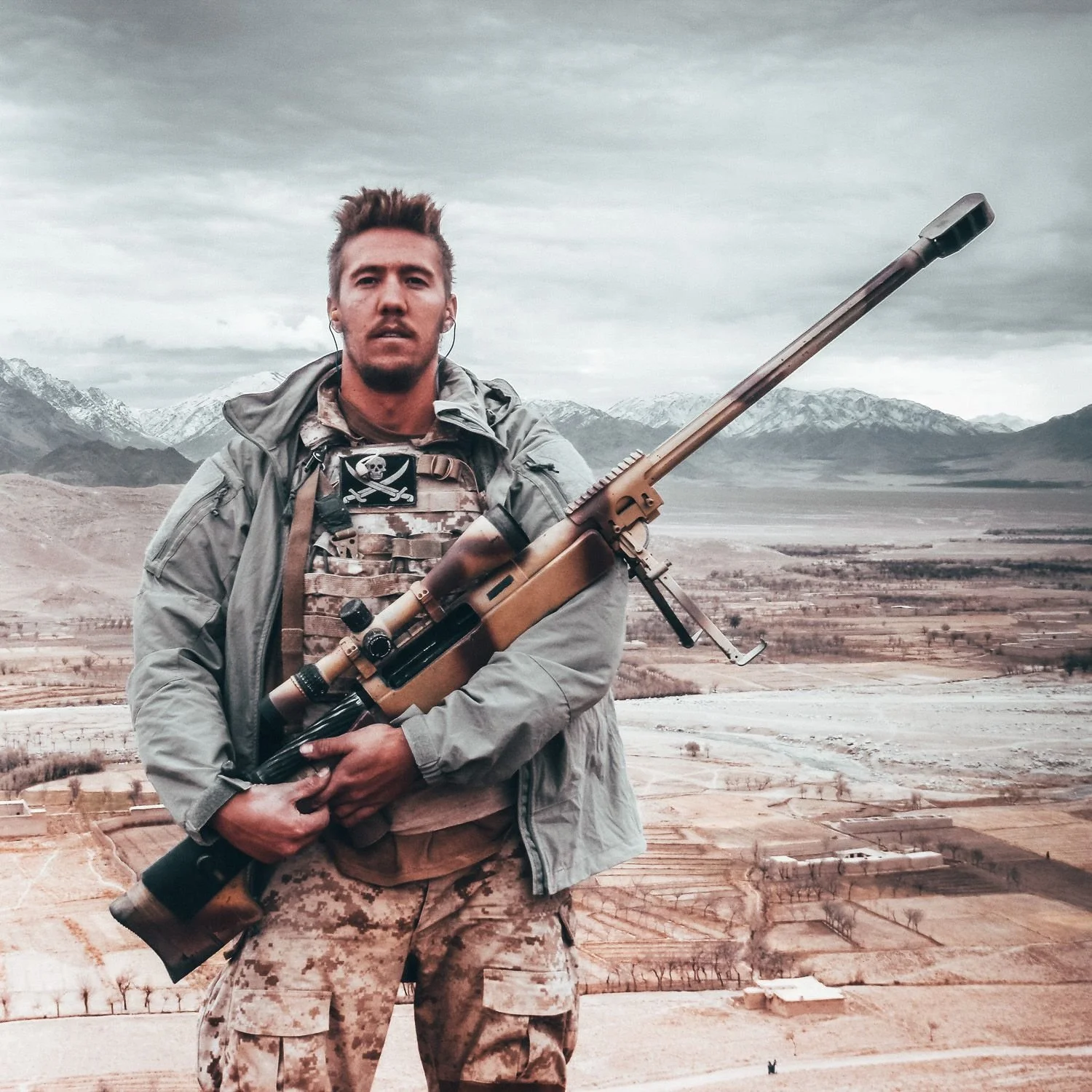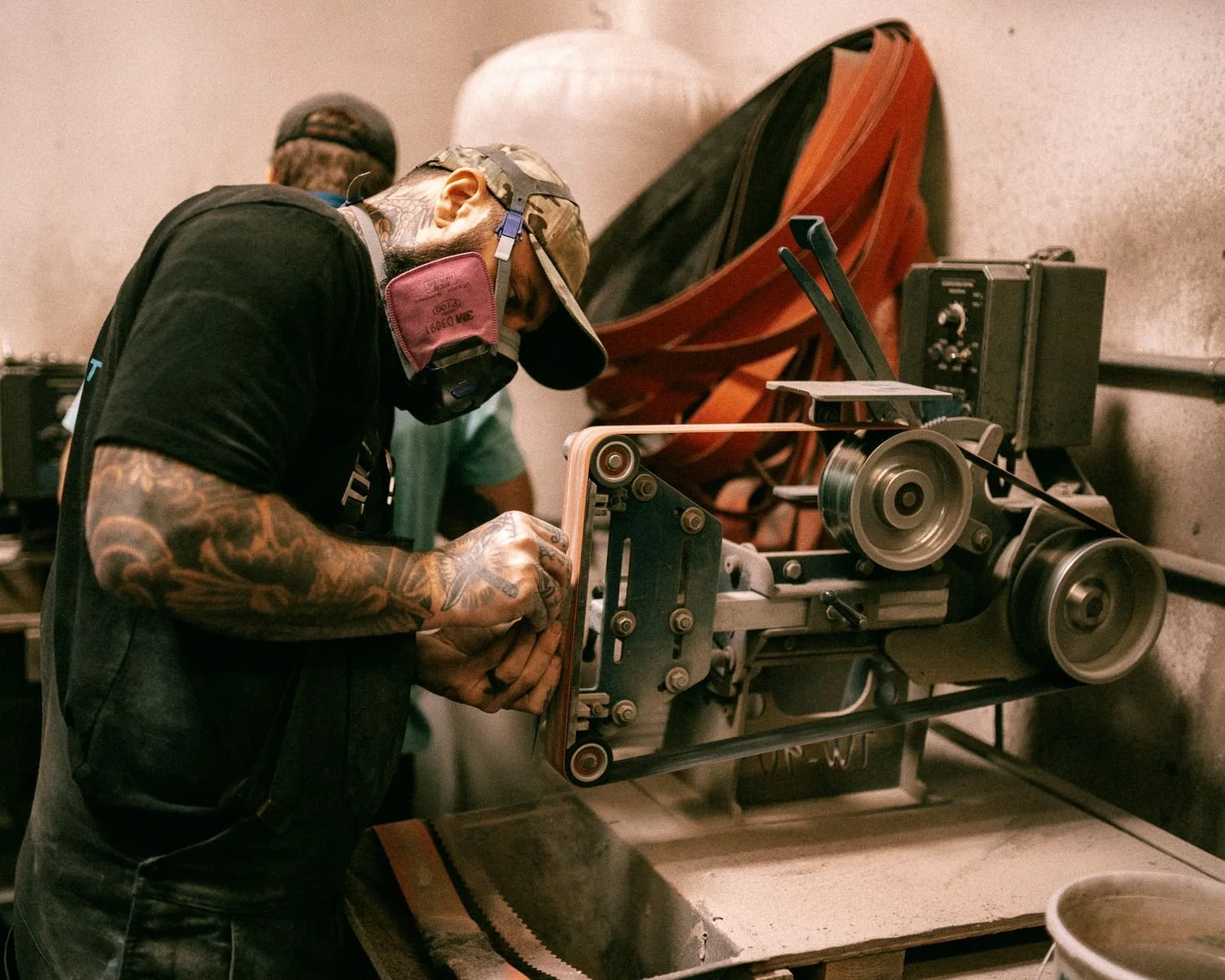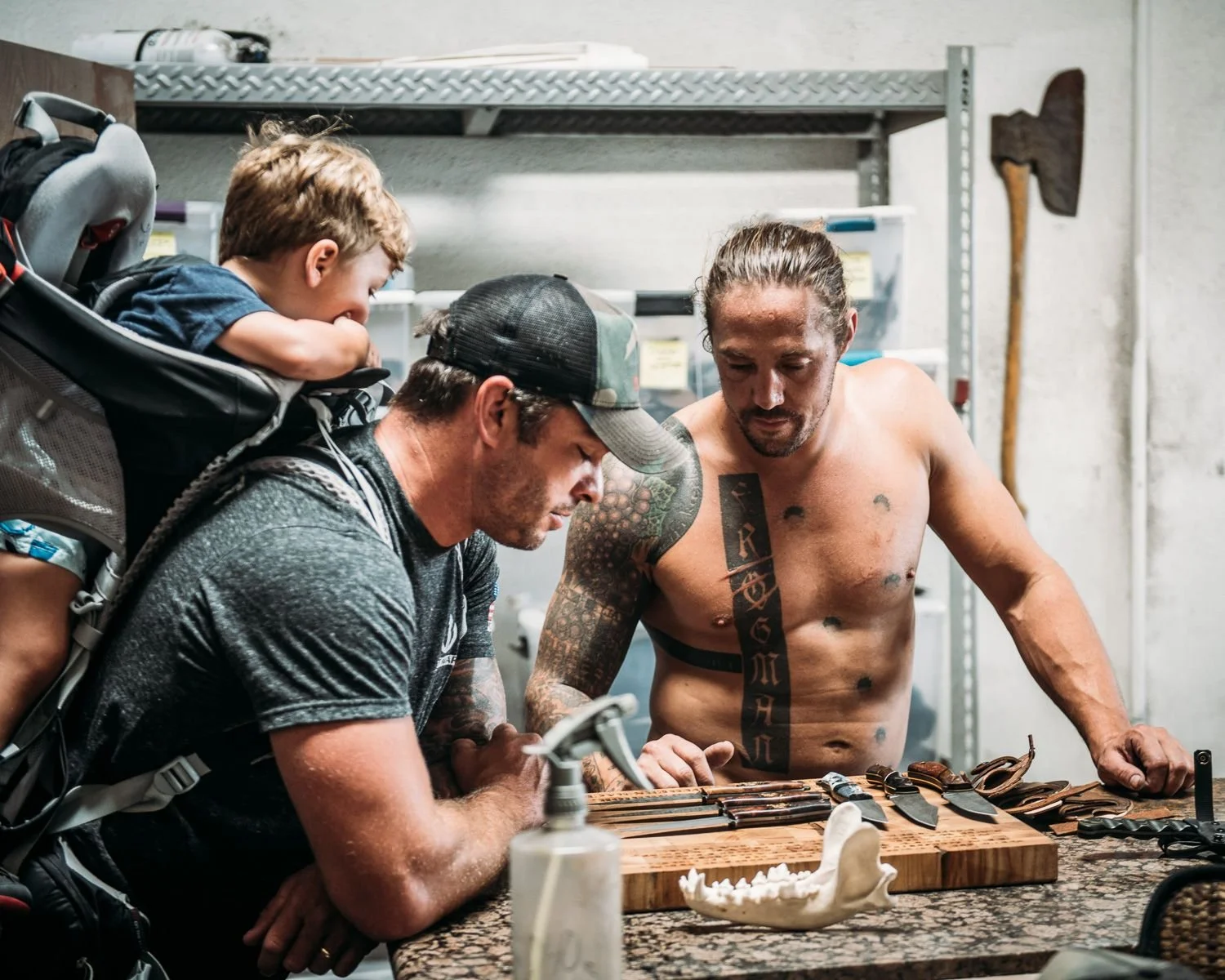Purpose Built - The Origins of Half Face Blades with Andrew Arrabito
In a world flooded with mass-produced gear and disposable tools, there’s something reassuring and inspiring about holding a handcrafted blade, especially one made with purpose, precision, and a story.
Andrew Arrabito
At the center of the Half Face Blades story is Andrew Arrabito, a retired Navy SEAL, outdoorsman, entrepreneur and all-around craftsman. For Arrabito, making knives isn’t just about utility; each blade is shaped by real experience and a passion to create something that lasts. More than just knives, HFB makes tools built to be used, passed down, and remembered.
Since launching Half Face Blades in 2015, Arrabito has turned his vision into one of the most respected American blade brands out there. Known for their rugged design and unique personality, HFB knives stand out, especially their signature split scale builds, often made with rare or personally significant materials. Unlike a lot of gear today, every HFB product is made in the U.S.A., a reflection of Arrabito’s belief in American manufacturing and veteran-powered craftsmanship.
In this article, Andrew talks about the risks and rewards of building a business from the ground up, the discipline required to uphold quality in a world of mass production, and how making dependable blades helped shape a purpose-driven life after the military.
Whether you're a knife enthusiast, entrepreneur, or someone drawn to stories of vision and determination, the Half Face Blades story is a look at what it means to build something that lasts.
Ox & Company: Andrew, can you take us back to the beginning, what inspired you to start Half Face Blades? Did you know you wanted to go into business for yourself when you left the Navy?
Arrabito: I actually got into a completely different business when I first got out of the service; I joined with some other people and started a brewery and distillery in San Diego. Ultimately I didn’t like how it was being run, so I got out of that situation. I then spent some time working a bit in Hollywood on movies with some really cool people. As fun and interesting as that can be, it just wasn’t for me. Living full time living in the city, especially one as massive as LA, wasn’t going to be a fit. I guess I learned through this phase that I wasn’t the type to work for other people, and that I wanted to build my own thing. HFB was formed once I figured that out.
Ox & Company: Part of the appeal of your knives seems to be that they reflect a personal philosophy, purpose with soul. What values or mindset did you bring from your time in the outdoors, and the military, into your blade design and construction process?
Arrabito: As an end user with experience using knives and tools in the great outdoors, in warzones overseas, and having been blessed to work with some of the best people in the military, it was really important to me to make something people can depend on. Whether it is a more simple production model or higher-end custom build. People are all different and their needs are different as well, but everyone wants something they can rely on. I wanted to create a tool that was dependable, but also something that you can connect with on a deeper level. Customization and using different, unique materials really made that possible. I love the American West and Native American culture, where these types of tools were used to their fullest back in the day - that part of me came through to the knives also.
Ox & Company: What were some of the biggest hurdles in getting Half Face Blades off the ground, especially in an industry dominated by mass production and overseas manufacturing?
Arrabito: I really just stayed focused on what I knew and had fun with it, and, most importantly, didn’t spend my time worrying about how others did it. I knew through my own end user experience what I felt was needed as I started designing and building. And working for myself allowed me to be creative and make what I liked.
Ox & Company: You’ve been vocal about manufacturing in the U.S. Why was that so important to you, and what are the realities, both the rewards and the struggles, of keeping your production domestic?
Arrabito: I am patriotic, I want to support American made, and being prior service (military) I really felt that needed to be a large focus on how I made product. The cost is much higher, but I really wanted that added value that comes from manufacturing here in the USA. It was very important to me personally, but I also wanted those people who were buying my knives and tools to know they were also investing in something great, something that can be used and retains or can even gain in value. That can be used with confidence, and pride. The main challenge and/or struggle I’ve encountered keeping things domestic would just be the high costs of making all American, high quality products, and ultimately then having to sell the products at higher price points.
It’s very important to me that I take care of my employees as well, and that we work as a team, not cutting corners just to get a product out. Longevity is key.
Ox & Company: Was there a particular moment when you realized this wasn’t just a passion project, but a viable business with real demand, and even a growing cult appeal?
Arrabito: Honestly, initially I was intending to give some of my first knives away and just make some for my buddies. As I got into it, people started telling me they wanted to buy some. I felt bad even charging people in the beginning, but I saw such a large influx of support that I pretty quickly figured out that there was an opportunity to take my past life experience and create something of real value to others; to help friends by getting the right tools in their hands, to create a company and support many peoples lives through business, providing jobs and connecting with charities, etc.
Ox & Company: Can you walk us through what “quality” means at Half Face Blades? How do you train your team, source materials, and maintain that hands-on attention to detail as you grow and expand the business?
Arrabito: Quality to me means not cutting corners. It’s been a learning process actually because we use so many different materials, and they need to be handled and treated very differently. We start by really focusing on making sure that important blade aspects such as the edge retention are covered by selecting the right steel for the job, the correct heat treatment, and then also the correct angle for grinding the steel. The blade thickness comes into play as well. I really focus in on what is the purpose of this tool? If it’s a skinning knife we need to start with that purpose and build from that end use first. Priority is being able to do the job it’s designed for first, then we go back and build it to that spec. Using all the best materials and making sure each step is focused and is in line with the desired end result: a tool that works in the hands of the end user perfectly.
It’s an evolution. We changed how we skeletonize our knives for adhesive flow through. We have changed certain blade thicknesses over time through good feed back from our users. There are so many small nuances and differences between a mass produced blade and a higher end, quality built blade that people don’t see unless they look for those details.
We’re always going back to look at blade shapes and angles that work, how they can be improved. I really instill in my guys the drive to do it right the first time, focus on the quality. I like to send guys out on hunting and fishing trips so they can use the knives and experience the results of how we make them, which they bring back with them to the shop.
Ox & Company: You’ve built more than a company, you’ve built a community. How intentional was that, and what do you think draws people so deeply to the Half Face brand beyond the blade itself?
Arrabito: It was not intentional actually, but as the brand grew and people really loved the knives and tools they started connecting with each other. Especially through social media. Helping others was always a big part of why I wanted to grow this into a real business, and seeing the love and support was wild, and rewarding. People now get together around the country, hunt and fish, raise funds for others in need and support charities. It has been truly amazing seeing the growth and the impact. To me, they are tools and I love to make them and use them. It’s been a blessing to watch how others have really embraced HFB and embodied what makes something great: it’s the community that makes something truly great.
Ox & Company: In a world of throwaway culture, your knives are designed to last. How do you think that philosophy resonates in today’s marketplace?
Arrabito: Well I hope it shows that chasing quick money doesn’t hold value and doesn’t create a culture of care for others. I’m not hacking on people who create a business that goes big, and they sell. But I wanted longevity in HFB and seeing it grow into an awesome culture/brand really gives me a desire to keep pushing forward with showing that hard work, quality and community will keep you thriving and healthy. A lot of people want the quick buck and cut every corner to make a cheap product, put half their money into smoke and mirrors marketing, hire the most well known ambassadors for thousands of dollars because of their following, but they are making a cheap throw away product. There’s no value in that to me; I want people’s investment into their gear to be of value, longevity and to be able to pass along their experience. Focus on quality, taking care of others, live it.
Ox & Company: What lessons from elite military life carry over into running a company in terms of discipline, leadership, and staying calm as problems arise?
Arrabito: Always keep pushing forward through the ups and downs. Take care of your people. Don’t reflexively jump to the newest, shiniest things because that’s not longevity or quality, usually. Stay focused on whats good. I think understanding that good and bad is bound to happen, accepting that, and then how we navigate that chaos is what counts. One of the biggest lessons for me was creating a really amazing team, and giving them the tools and responsibility to do well, and train them to do great. If you have a good team you have it all.
Ox & Company: What does legacy mean to you? When someone holds a Half Face blade, what do you hope they feel or understand about the story behind it?
Arrabito: I want them to really love that tool. To have a connection to it and how they use it. To know that it’s dependable when they use it. That the brand behind that tool wants the best for them. I hope people also focus on what they can do for those around them. “Protect and Provide” is a huge mantra describing who we are at HFB, and how we want others to live.
To learn more or follow the latest from Half Face Blades, visit halffaceblades.com and follow them on Instagram @halffaceblades. Follow Andrew Arrabito on Instagram @specoperator.



